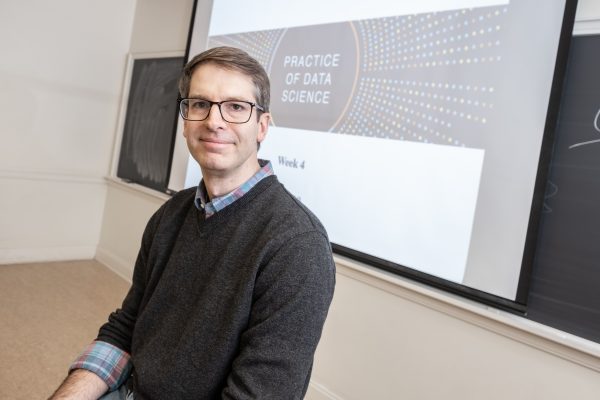Minor in Data Science
As a school without walls, the School of Data Science works across grounds in almost every department, from the School of Medicine, to the UVA School of Education and Human Development, to the Batten School of Leadership and Public Policy, and more.
With an interdisciplinary focus and collaboration at the heart of the School of Data Science, creating an opportunity for undergraduate students at the University to pursue an education in Data Science has been a goal for a long time.
To achieve this goal, the School of Data Science has created a minor in Data Science, which was just recently officially approved.
“The minor is an on-ramp for a broad spectrum of undergraduates to acquire quantitative skills for working in a data driven society,” said Phil Bourne, Dean of the School of Data Science.
Part of the mission behind creating a minor in Data Science is to provide students with the opportunity to learn about data and this growing field alongside their liberal arts education to carry with them into a variety of vocations.
“The demand for computational and data-related knowledge has become critical to almost all post-graduation endeavors,” said Brian Wright, Professor at the School of Data Science. “So we wanted to ensure UVA students had options to expose themselves to these concepts.”
The minor is data science is designed for any undergraduate student, and the Admissions Team hopes that students across Grounds apply.
“We’re excited to offer the Undergraduate Minor to UVA undergraduates, and not only those interested in STEM fields, but all UVA undergraduates,” said Patti Edson, Director of Admissions and Financial Aid at the School of Data Science. “Data is ubiquitous and understanding its power and potential in any field -- equity & justice, commerce, global development or environmental studies – will equip liberal arts students broadly with the tools to be exponentially more successful in their given field.”
Students from any major across Grounds may apply to this minor, as long as they have completed an introductory statistics course.
Once accepted to the minor, students must complete a course from four areas, each which is a pillar of the school of data science, as well as an elective course. There is broad flexibility in terms of course options within each area.
The four pillars are analytical, systems, design, and value.
The minor comes to a total of five courses, or 15 credits, not including the prerequisite course.
Within each pillar, students have a variety of choices and flexibility. As data science intersects almost every industry, the minor is designed to allow students to study data science especially pertinent to their particular area of interest.
For example, a student in the McIntire School of Commerce can choose to take Database Management Systems and Business to complete the Systems pillar. A student in the Batten School of Leadership and Public Policy can take Integrating Ethics in Public Policy to complete the Data Value pillar.
The School of Data Science eventually plans to offer an undergraduate major, but the minor is the first step in this process.
“The minor is a precursor to a full 4-year degree in data science, allowing us to create a small number of undergraduate data science courses and electives as well as begin to corral the wonderful offerings that exist on Grounds already,” Bourne added.
The ability to work with data has become a crucial skill in a variety of careers, disciplines, and fields of study. The minor in data science is an opportunity for students to supplement their education with quantitative classes.
“The minor provides a much-needed pathway for students to explore the core concepts of data science,” Wright said. “It also allows students to feel confident when they enter careers or graduate work that has an emphasis on data-related skills.”
Entering the undergraduate space is an exciting step for the School of Data Science.
“We welcome and anticipate the undergraduates' arrival, and the extraordinary passion and drive they traditionally bring to any community they enrich with their energy and focus,” Edson said, excitedly.
Learn more about prerequisites, required courses, the application process, and more here.

